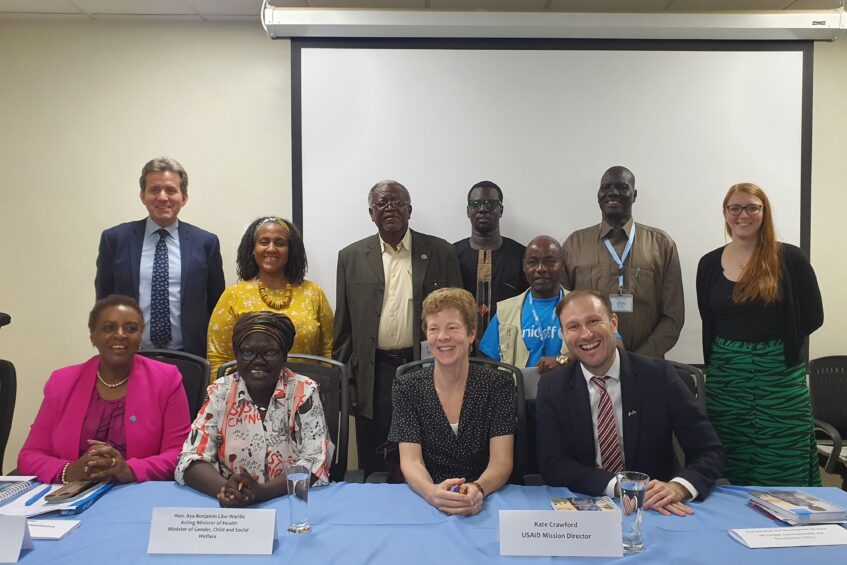
Healthcare stakeholders at a joint press conference to mark the 10th anniversary of the global maternal and child survival call for action. | Credit: Courtesy.
The Ministry of Health says social norms and Gender-Based Violence are the leading obstacles to the reduction of maternal and newborn mortality in the country.
Last week, the health ministry and partners commemorated the 10th anniversary of the Global Maternal & Child Survival Call to Action.
Ayaa Benjamin Warille, who represented the Ministry of Health at the occasion, said norms around childbirths are preventing many mothers in South Sudan from seeing skilled birth attendants, giving birth at a health facility, or visiting antenatal care.
Aya, who is the Minister of Gender, Child and Social Welfare stated that majority of mothers are below the age of 18 – making it difficult to improve maternal and newborn outcomes.
“Our cultures manifested by early marriages and early childbearing rates are 28 percent of those giving birth are under the ages of 18 and gender-based violence remain the main driver,” said Aya speaking on behalf of Minister Yolanda Awel Deng.
“The Ministry of Health is struggling to improve maternal and newborn health outcomes as stipulated in the national health sector policy and strategy, major obstacles remain in its path.”
The maternal mortality rate in South Sudan remains one of the world’s highest at more than 1,150 deaths per 100,000 live births, according to the ministry.
This is attributed to infection, hemorrhage, and prolonged and obstructed labor.
Meanwhile, the USAID Mission Director for South Sudan, Kate Crawford said the situation of mothers and children remains dire in the country.
“Yet unfortunately, the situation for mothers and children in South Sudan does not reflect positive global trends and the situation in this country remains exceptionally dire for women and girls,” she said in a statement.
“The best predictor of a family’s health is the health and education of the mother. The persistently low levels of female literacy, the high rates of gender-based violence, and the lack of access to quality health care continue to harm women, their children, and their communities.”
She added: “This country will never reach its full potential without realizing the potential of half its population.”
The USAID, UNICEF, and the United Kingdom recommitted to contributing towards preventing child and maternal deaths in South Sudan.
The agency said between 2011 to 2020, mothers who delivered babies in a health facility increased from 16.2 percent to 41.8 percent.
The number of mothers who delivered in the presence of skilled health personnel also increased from 22.1 percent to 39.8 percent.
Support Eye Radio, the first independent radio broadcaster of news, information & entertainment in South Sudan.
Make a monthly or a one off contribution.
Copyright 2024. All rights reserved. Eye Radio is a product of Eye Media Limited.